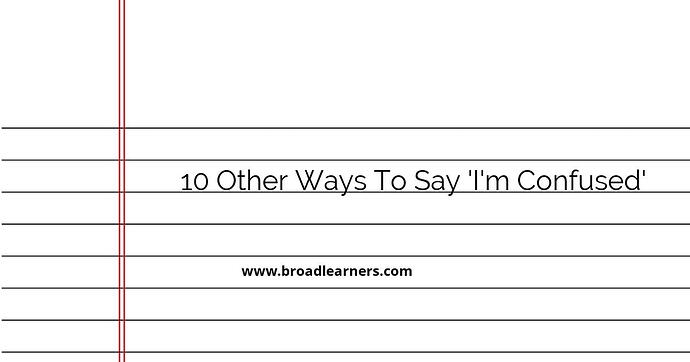Feeling confused is something we all experience from time to time. However, constantly using the same phrase 'I'm confused' can become repetitive. To help you express your confusion in different ways, here are 10 alternative phrases:
- I'm perplexed
- I'm puzzled
- I'm at a loss
- I'm uncertain
- I'm bewildered
- I'm unsure
- I'm disoriented
- I'm mixed up
- I'm in a muddle
- I'm befuddled
Let's explore each alternative phrase in more detail:
1. I'm perplexed
If you're perplexed, it means you're completely puzzled or confused. This phrase is often used when you can't understand or make sense of something.
Example: 'I'm perplexed by the instructions for this new gadget.'
2. I'm puzzled
When you're puzzled, it means you're unable to understand or solve a problem. This phrase is commonly used when you're trying to figure something out but can't.
Example: 'I'm puzzled by the sudden change in his behavior.'
3. I'm at a loss
'I'm at a loss' indicates that you don't know what to do or say in a particular situation. It implies a feeling of confusion and being unsure of how to proceed.
Example: 'I'm at a loss for words after hearing the news.'
4. I'm uncertain
If you're uncertain, it means you're unsure or hesitant about something. This phrase is often used when you're not confident in your understanding or decision.
Example: 'I'm uncertain about which option to choose.'
5. I'm bewildered
When you're bewildered, it means you're completely confused and disoriented. This phrase is used to express a state of utter confusion and being lost.
Example: 'I'm bewildered by the complex instructions.'
6. I'm unsure
'I'm unsure' indicates that you're not certain or confident about something. It implies a lack of clarity or understanding.
Example: 'I'm unsure of the correct answer to this question.'
7. I'm disoriented
If you're disoriented, it means you're confused about your surroundings or situation. This phrase is often used when you feel lost or unable to navigate.
Example: 'I'm disoriented in this unfamiliar city.'
8. I'm mixed up
'I'm mixed up' implies that you're confused or have made a mistake. It suggests a state of disarray or jumbled thinking.
Example: 'I'm mixed up and can't remember where I put my keys.'
9. I'm in a muddle
If you're in a muddle, it means you're in a state of confusion or disorder. This phrase is used when things are chaotic or unclear.
Example: 'I'm in a muddle trying to sort out my schedule.'
10. I'm befuddled
When you're befuddled, it means you're completely confused or perplexed. This phrase is often used when you can't make sense of something.
Example: 'I'm befuddled by the complicated instructions.'
By using these alternative phrases, you can effectively communicate your confusion in different situations and avoid sounding repetitive. Remember to choose the phrase that best fits the context and conveys your level of confusion.
Did I miss anything? Respond below
